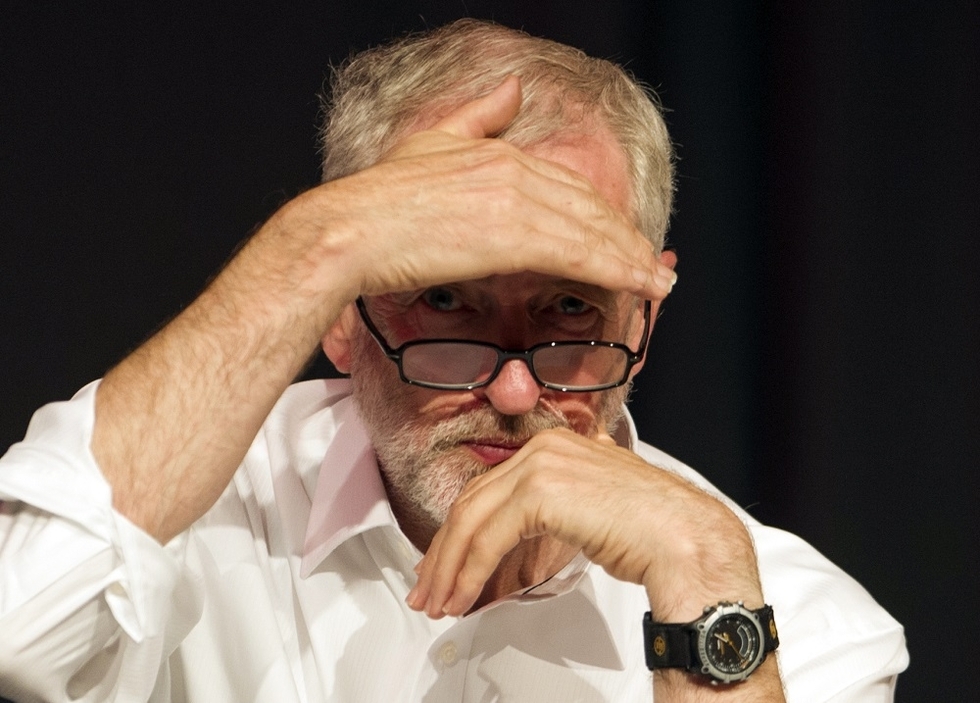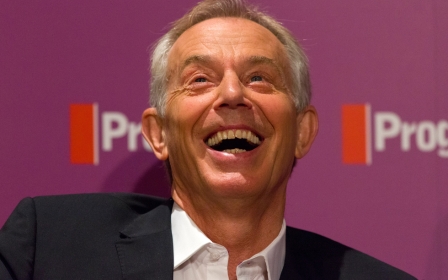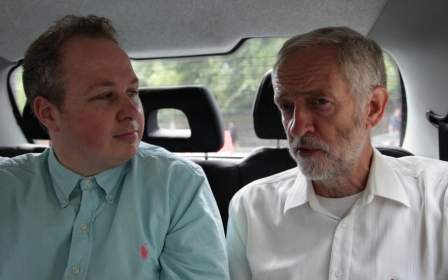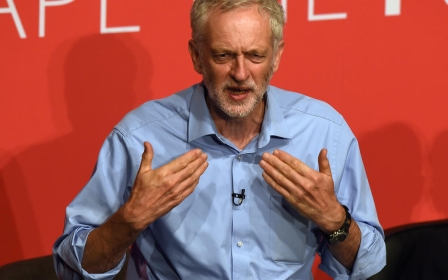Raed Salah lawyer questions controversial Channel 4 Corbyn interview

A TV interview with Jeremy Corbyn has sparked controversy after he was pilloried for his connections to an Islamist preacher who was cleared by a British court of all charges of anti-Semitism, but has since been convicted by an Israeli one in a case that is currently under appeal.
In the interview, Channel 4 News' Cathy Newman, accused Corbyn, the UK Labour Party leadership candidate, of “misjudgement” over his links to a Holocaust denier, Paul Eisen.
She also asked whether Corbyn regretted describing Islamic Movement preacher, Raed Salah, as "a very honoured citizen" given, Newman said, that Salah had been convicted of "the anti-semitic slander" that Jews use children's blood to make bread, also referred to as blood libel.
Salah is a Palestinian citizen of Israel who belongs to the northern branch of the Islamic Movement, an Israel-based political group.
The accuracy of Newman's accusations have since been widely challenged including by Salah's lawyer, Hassan Tabajah.
Tabajah told Middle East Eye on Tuesday that both a UK court and Israel's Jerusalem Magistrate Court exonerated Salah on charges of racial incitement for comments that he made in a 2007 sermon in East Jerusalem.
The magistrate court did, however, convict Salah with incitement to violence after three Israeli policemen were reportedly injured after the sermon although it was unclear whether the attackers had heard Salah speak.
"The court’s decision ultimately rejected the connection between Salah’s speech and its violent aftermath due to a lack of conclusive evidence that the stone-throwers were present at Salah’s address," The Times of Israel reported.
When Salah was cleared of racial incitement in the magistrate court in 2013, Israeli state prosecutors appealed the charges in the Jerusalem District Court.
Last November, that court convicted Salah for racial incitement, but Tabajah said he has appealed the ruling in Israel's High Court. A ruling is expected in the coming months.
Corbyn's meeting with Salah
In the interview, Newman suggested that Corbyn might regret praising Salah during his June 2011 visit to the UK, saying he had been "convicted of the blood libel".
“Salah was allowed to travel [to the UK] by the Israeli authorities,” Corbyn said while arguing that the authorities would have stopped him if he had in fact been convicted.
“They stop plenty of other people,” he added.
While Salah was allowed to leave Israel for the trip, he was arrested several days after arriving in the UK after it emerged that Home Secretary Theresa May had issued an exclusion warrant against him.
He was subsequently freed upon appeal and awarded damages, with the judge at the immigration tribunal ruling that the case against Salah was carried out "under a misapprehension as to the facts" and was “very weak”.
Saleh wrote in The Guardian after he was freed: "After a 10-month legal battle, I have now been cleared on "all grounds" by a senior immigration tribunal judge, who ruled that May's decision to deport me was "entirely unnecessary" and that she had been "misled". The evidence she relied on (which included a poem of mine which had been doctored to make it appear anti-Jewish) was not, he concluded, a fair portrayal of my views. In reality, I reject any and every form of racism, including antisemitism.I have no doubt that, despite this, Israel's cheerleaders in Britain will continue to smear my character. This is the price every Palestinian leader and campaigner is forced to pay."
Corbyn said he met with Salah during his house arrest, presumably referring to Salah's time after he was released from UK custody on bail in late June 2011.
The two, Corbyn said, had a long conversation about multi-faith objectives, the rise of Islamophobia and anti-Semitism.
"He did not at any stage utter any anti-Semitic remarks to me whatsoever during that conversation," Corbyn told Newman during the interview.
"But he had been convicted and you described him as an honoured citizen," Newman responded.
"I was unaware of that at the time," Corbyn said.
"Another midjudgement?" she said.
"I'm sorry you are putting an awful lot of words into my mouth about misjudgement. My point is that any form of racism in any situation is absolutely wrong. . . the need to talk to people is absolutely right if you are to bring about a peace process," said Corbyn.
Discussing the interview late Tuesday, Tabajah, Salah's lawyer, wondered how many judicial tribunals should be held to examine his client's statement.
“Should we examine 10 times? 30 times? 100 times? For me, the British people should trust their tribunals, not Israeli tribunals. How many times should we examine the words? He is not trying to hide. Sheikh Raed has clearly declared that he does not believe in the blood libel.”
He added that he was, however, not surprised that his client's situation had become an issue in the Labour leadership race.
“I don’t find it strange because I believe that there is some party that would try to frighten the British people in any way and this is the trend of this modern age, of referring to Islamic figures as a source of fear and terror to the British people," he said. "I think this is a sad situation, but this what is happening in the other places in the world.”
Holocaust denial
Newman's interview also quizzed Corbyn on his links to Paul Eisen, a Holocaust denier who heads up the Deir Yassin Remembered organisation, named for a Palestinian village where a massacre was perpetrated by Zionist militias in 1948.
Eisen has claimed Corbyn “[got] out his checkbook” at a Deir Yassin Remembered event, but Corbyn said that any donations to the organisation would have been given in a collection bucket.
He also told the interviewer that Eisen was not known to be a Holocaust denier 15 years ago when he attended the event, and stressed that he would not have gone if Eisen had been associated with such views at the time.
"Had he been a Holocaust denier, I would have had absolutely nothing to do with him. I was moved by the plight of people who had lost their village in Deir Yassin,” Corbyn said.
“I have no contact now whatsoever with Paul Eisen and Deir Yassin Remembered. I did attend a number of events concerning Deir Yassin Remembered some years ago, I think two or three of them.”
“Obviously, Holocaust denial is vile and wrong. The Holocaust was the most vile part of our history. The Jewish people killed by the Nazi Holocaust were the people that suffered the most in the 20th century,” he added.
Middle East Eye propose une couverture et une analyse indépendantes et incomparables du Moyen-Orient, de l’Afrique du Nord et d’autres régions du monde. Pour en savoir plus sur la reprise de ce contenu et les frais qui s’appliquent, veuillez remplir ce formulaire [en anglais]. Pour en savoir plus sur MEE, cliquez ici [en anglais].




